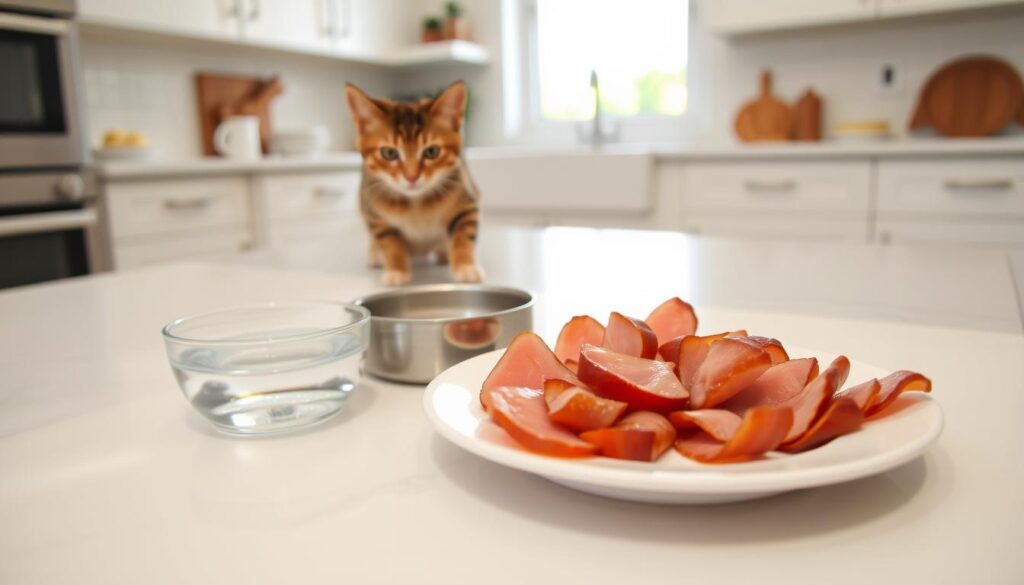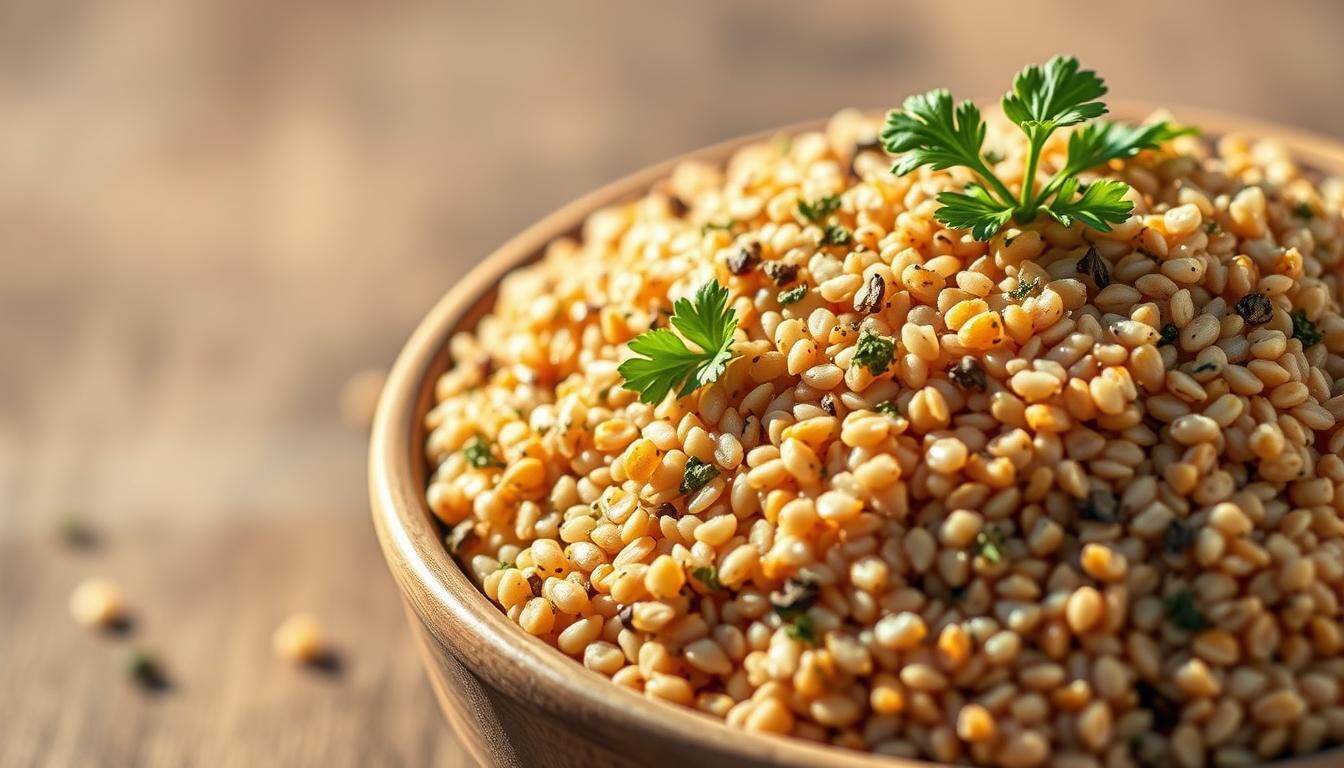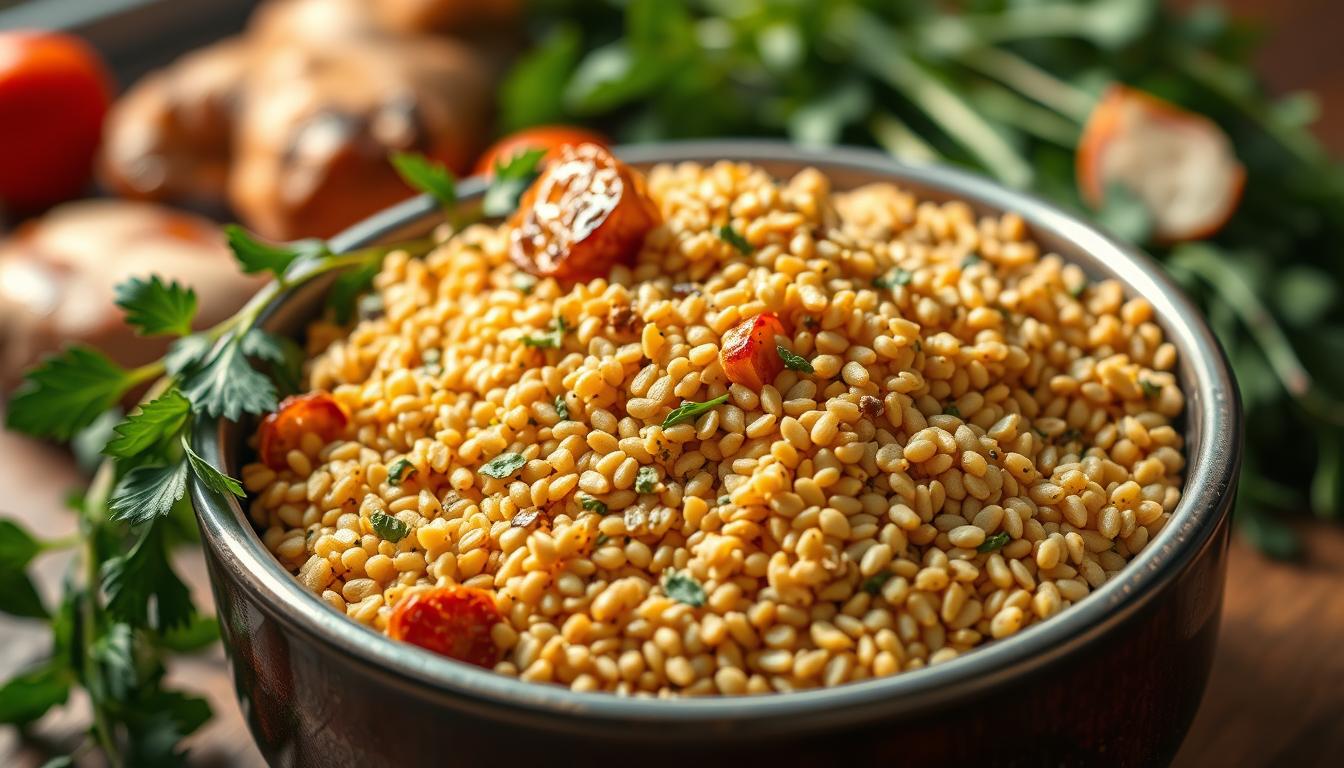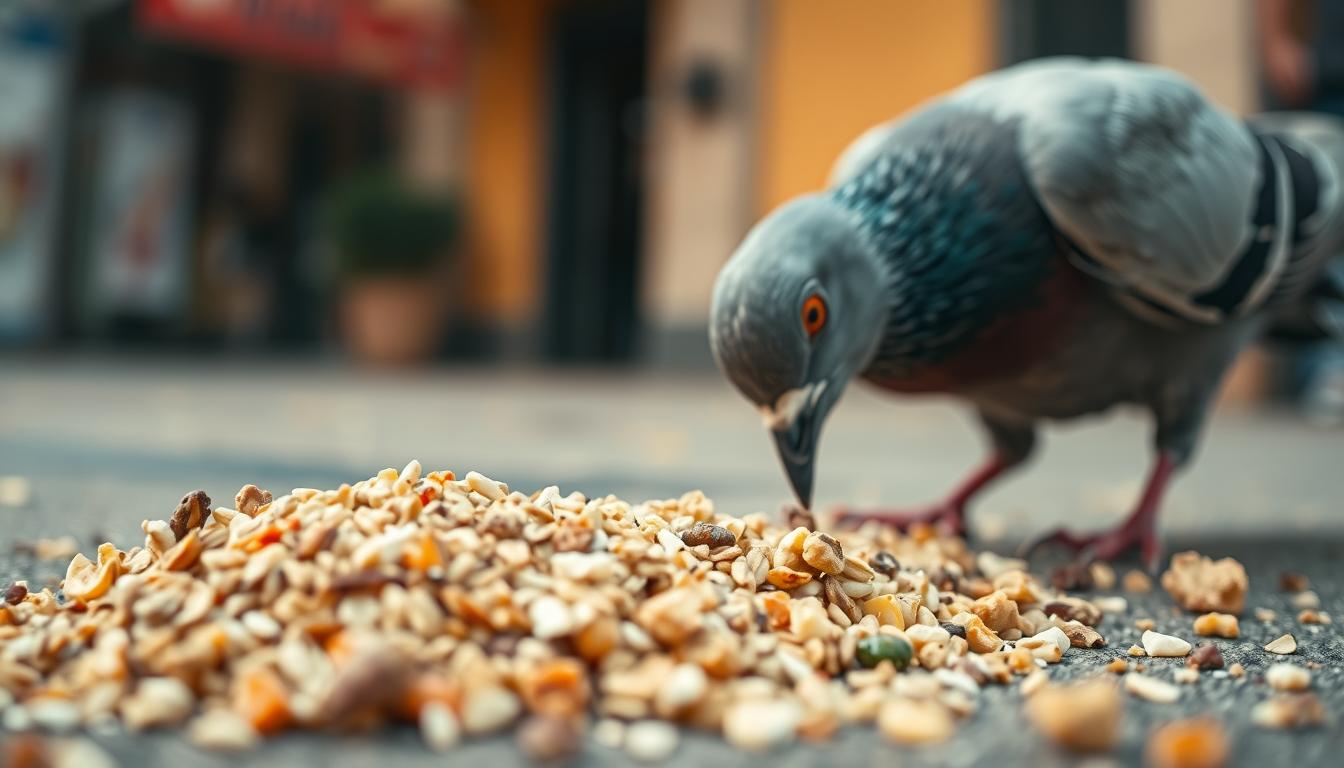Have you ever wondered if sharing a slice of ham with your cat is safe? Many pet owners find themselves asking this question, especially during holidays when tempting treats are plentiful.
Cats are curious creatures, and their eyes often widen at the sight of human food. However, not all human foods are safe for your feline friend. Ham, in particular, can pose hidden risks due to its high sodium and fat content.
Understanding these risks is crucial for your cat’s health. This article will delve into the surprising dangers of ham for cats, backed by expert insights and reliable sources.
While an occasional small treat might seem harmless, the cumulative effects of high-sodium and high-fat foods can lead to serious health issues. Veterinarians often warn against overindulging your cat with such snacks.
Stay tuned as we explore safer alternatives and provide guidance on treating your cat responsibly.
Table of Contents
Understanding Cats’ Dietary Needs
Cats have unique dietary needs that set them apart from other pets. Their bodies are designed to thrive on specific nutrients found in meat, making them obligate carnivores.
Nutritional Requirements for Felines
A cat’s diet must be rich in animal-based proteins, which provide essential amino acids like taurine. These nutrients are crucial for heart health, vision, and muscle function.
Commercial cat food is formulated to meet these needs, ensuring a balanced mix of proteins, vitamins, and minerals. Feeding your cat a complete diet helps maintain their overall health and prevents deficiencies.
Why Cats Are Obligate Carnivores
Cats require a diet high in protein from animal sources. Their digestive system is tailored to process meat efficiently, extracting nutrients that plants can’t provide.
Feeding your cat human food, especially processed meats like ham, can disrupt this balance. High amounts of salt and fat in such foods can lead to health issues, including obesity and organ damage.
It’s important to limit human food snacks to no more than 10% of your cat’s daily calorie intake. Always choose lean, unseasoned options to avoid harmful additives.
Understanding your cat’s dietary needs is key to their well-being. By sticking to a balanced, nutrient-rich diet, you can help your cat live a healthy, happy life.
Is Ham Bad for Cats?
Feeding your cat ham can be risky due to its high sodium and fat content. These can lead to serious health issues like pancreatitis or salt poisoning. Veterinarians warn that even small amounts can be harmful.
Identifying the Hidden Dangers
- High sodium can cause vomiting, diarrhea, and dehydration.
- Excessive fat may lead to obesity and pancreatitis.
- Preservatives and spices in ham can harm your cat’s digestive system.
Veterinarian Insights on Ham Consumption
Vets advise against feeding ham to cats. It’s best to avoid processed meats altogether. If you do give ham, ensure it’s plain, unseasoned, and cooked thoroughly to kill bacteria. However, the risks often outweigh any benefits.
Consider safer, leaner protein sources instead. We’ll explore these alternatives later.
Why Cats Crave Human Food
Cats are naturally curious creatures, and their interest in human food often stems from both aroma and taste. The allure of treats like ham can be strong, but understanding why your feline friend is drawn to such foods is key to managing their diet effectively.
The Allure and Curiosity Behind Treats
Human food, especially processed meats like ham, offers a different sensory experience for cats. The combination of strong smells and flavors can trigger their natural curiosity, making them eager to explore these new tastes.
- Cats are drawn to the aromatic appeal of human food, which can be more enticing than their regular meals.
- Treats provide a novel experience, satisfying their curiosity without necessarily meeting their nutritional needs.
- Comparing human foods to a cat’s natural diet reveals a preference for high-protein options, which align with their instinctual cravings.
While occasional treats can be a delightful option for your cat, moderation is essential. Ensuring that these indulgences don’t harm your feline friend’s health is crucial. Always opt for safe, nutritionally balanced choices to satisfy their curiosity without risking their well-being.

Safe Serving Practices for Ham Treats
While ham can be a tempting treat for your cat, it’s important to handle it with care. To ensure your cat’s health, follow these safe serving practices.
Proper Preparation and Cooking Techniques
Cooking ham thoroughly is essential. Trim all visible fat to reduce the fat content. Seasonings like salt and spices should be avoided, as they can harm your cat.

Determining Appropriate Serving Sizes
Portion control is key. Offer pea-sized pieces, ensuring treats make up no more than 10% of your cat’s daily calories. Consider your cat’s weight and overall diet when deciding portions.
- Choose lean, low-sodium ham to minimize health risks.
- Read labels carefully to avoid harmful preservatives.
- Consult your vet for portion advice tailored to your cat.
By following these guidelines, you can safely offer ham as an occasional treat, keeping your cat healthy and happy.
Alternative Protein Options for Your Feline Friend
While ham can be tempting for your cat, it’s important to explore healthier protein sources. Veterinarians recommend lean meats like chicken and turkey as safer alternatives. These options align more closely with your cat’s natural diet, offering essential nutrients without the risks associated with processed meats.
Benefits of Lean Poultry and Turkey
Cooked, unseasoned chicken and turkey are excellent choices. They are high in protein and low in fat, making them a healthier option. These meats provide essential amino acids that support your cat’s muscle health and energy levels. Unlike ham, they contain less sodium and no harmful preservatives, reducing the risk of health issues like obesity and pancreatitis.
Exploring Fish and Other Seafood Treats
Fish can be a nutritious treat for your cat. Fatty fish like salmon are rich in omega-3 fatty acids, which support skin and coat health. However, moderation is key. Fish should not make up more than 10% of your cat’s diet due to potential mercury content. Always opt for plain, cooked fish to avoid harmful additives.
Switching to these alternatives can significantly improve your cat’s health. Lean proteins reduce the risk of obesity and digestive problems, while fish provides beneficial fatty acids. Always consult your veterinarian to determine the best diet for your feline friend, ensuring their specific needs are met.
Understanding the Risks of Processed Meats
Processed meats, such as ham, pose significant risks to your cat’s health due to their high sodium and preservative content. These ingredients can lead to serious conditions like pancreatitis and heart issues, making it crucial for cat owners to be aware of the dangers.
High sodium levels in ham can cause vomiting, diarrhea, and even salt poisoning in cats. The excessive fat in processed meats contributes to obesity and pancreatitis, both of which can severely impact your cat’s quality of life. Additionally, preservatives in ham can harm your cat’s digestive system, further complicating their health.
- High sodium can lead to vomiting, diarrhea, and dehydration in cats.
- Excessive fat in ham contributes to obesity and pancreatitis.
- Preservatives in processed meats can disrupt your cat’s digestive health.
Cats with pre-existing heart or kidney conditions are particularly vulnerable to these risks. Veterinarians strongly advise against feeding cats processed meats like ham due to the potential for severe health complications. Even small amounts can be harmful, so it’s essential to monitor your cat’s reaction to any new food and consult your vet immediately if you notice any signs of distress.
If you suspect your cat has ingested unsafe amounts of ham or other processed meats, contact your veterinarian promptly. Veterinarians recommend safer protein options like lean chicken or turkey, which are healthier alternatives for your cat’s diet. Always prioritize your cat’s health by choosing balanced, nutrient-rich foods and avoiding harmful processed meats.
Conclusion
Your cat’s diet is a critical part of their overall health, and understanding what foods are safe can make all the difference. As we’ve explored, while ham can be an occasional treat, its high sodium and fat content pose risks that make safer alternatives a better choice.
Always prioritize your cat’s nutrition by focusing on high-quality, balanced cat food as the foundation of their diet. When introducing human food, do so with caution and in moderation. Processed meats like ham should be avoided due to their harmful additives and high sodium levels.
Consult your veterinarian before making any significant changes to your cat’s diet. They can provide personalized advice to ensure your pet receives the nutrients they need while avoiding potential health issues. By choosing lean proteins and avoiding processed foods, you can help your cat thrive and enjoy a healthy, happy life.
FAQ
Can cats safely eat ham as part of their diet?
While cats can eat small amounts of ham, it should not be a regular part of their diet. Ham is high in sodium and fat, which can lead to health issues like weight gain and heart problems over time. Always opt for plain, unseasoned ham and serve it in moderation.
What are the risks of feeding ham to your cat?
Feeding ham to your cat can lead to an imbalance in their nutrient intake. High sodium content can cause dehydration and electrolyte imbalances, while excessive fat may contribute to obesity and pancreatitis. Additionally, many processed hams contain preservatives that are not ideal for feline health.
How much ham is safe for a cat to eat?
The amount of ham your cat can safely eat depends on their size and health. As a general rule, limit ham to no more than 1-2 teaspoons per 10 pounds of body weight, and only on occasion. Always remove any salty or fatty parts before serving.
Can cats eat cured or processed ham products?
Cured or processed ham products, such as deli meats, are not recommended for cats. These products often contain high levels of sodium, nitrates, and other additives that can be harmful to your feline friend. Stick to plain, cooked ham if you choose to offer it as an occasional treat.
What are healthier alternatives to ham for cats?
Cats thrive on lean, unseasoned meats like chicken, turkey, or fish. These options are closer to their natural diet and provide essential protein without the added salt and fat found in ham. Always choose plain, cooked meats and avoid any seasoning or sauces.
Should I consult a veterinarian before feeding ham to my cat?
Yes, it’s always a good idea to consult your veterinarian before introducing ham or any new food to your cat’s diet. They can provide personalized advice based on your cat’s health, age, and specific needs to ensure you’re making the best choice for their well-being.
Source Links
- Can Cats Eat Turkey? 13 Cat-safe Recipes for Thanksgiving – https://www.aol.com/lifestyle/cats-eat-turkey-13-cat-202002692.html
- 125 Interesting Facts About Practically Everything – https://www.rd.com/list/interesting-facts/
- 20 Bad Auto Habits Your Mechanic Wants You to Stop Doing – https://www.familyhandyman.com/list/bad-auto-habits/?srsltid=AfmBOoqiqxaIneXk9ZDy4aoKNLcWTAuzIULCC_EIvcl5nLq9lRPfDnSN
- Keep Your Cat Safe—Why Ham Is Not the Best Treat – https://www.thesprucepets.com/can-cats-eat-ham-8736310
- 13 Holiday Foods That Are Dangerous to Cats – https://www.petmd.com/cat/nutrition/holiday-foods-dangerous-to-cats
- Ham for Cats: Safe or Risky? Nutrition Guide | Bailey’s CBD – https://baileyscbd.com/blogs/cat-nutrition/ham-and-cats-dietary-considerations?srsltid=AfmBOopCIufhYChkmeh8sKq6G4DCz6vSnOnrMU8_zIgVMfINBetATruF
- Can Cats Eat Ham? Why Ham Isn’t the Best Choice for Your Little Carnivore – https://www.yahoo.com/lifestyle/cats-eat-ham-why-ham-060000590.html
- 15 Toxic Human Foods You Should Never Feed Your Cat – https://www.dailypaws.com/foods-toxic-to-cats-7494337
- 9 Human Foods That Cats Can Safely Eat: Vet-Reviewed Dishes – Catster – https://www.catster.com/nutrition/human-foods-safe-for-cats/
- 9 Human Foods That Are Safe for Your Kitty to Snack On – https://www.dailypaws.com/cats-kittens/cat-nutrition/what-can-cats-eat/human-foods-for-cats
- Can Dogs Eat Ham? | Great Pet Care – https://www.greatpetcare.com/dog-nutrition/can-dogs-eat-ham/
- Can Cats Eat Ham? Vet-Reviewed Health & Safety Guide | Hepper – https://www.hepper.com/can-cats-eat-ham/
- Can Cats Eat Ham? Exploring The Risks Of Processed Meats | Cat Boarding Hotel Laguna, Mission Viejo, Anaheim, Santa Ana, CA | Cats Luv Us – https://www.catsluvus.com/cat-food/can-cats-eat-ham-exploring-the-risks-of-processed-meats/?srsltid=AfmBOoo96nN_DvG7TGfgug2QMol8dI2URRhbH2BHKXm1h5R569h1N8Pq
- What can cats not eat? The complete guide – https://untamed.com/blogs/nutrition/what-can-cats-not-eat
- Can Cats Eat Ham? Exploring The Risks Of Processed Meats | Cat Boarding Hotel Laguna, Mission Viejo, Anaheim, Santa Ana, CA | Cats Luv Us – https://www.catsluvus.com/cat-food/can-cats-eat-ham-exploring-the-risks-of-processed-meats/?srsltid=AfmBOooBWUhyPwU1aqIQFwI1iCyH8YLUJ9BZIfPntDfQIe1Q6QQy5lRI
- Can Cats Eat Deli Meat (Lunch Meat)? Vet-Approved Facts & FAQ – Catster – https://www.catster.com/nutrition/can-cats-eat-deli-meat/
- What your cat should not eat – https://www.petplan.co.uk/pet-information/cat/advice/what-your-cat-should-not-eat/
- Can Cats Have Ham? – https://basepaws.com/cat-insider/can-cats-eat-ham
- Ham for Cats: Safe or Risky? Nutrition Guide | Bailey’s CBD – https://baileyscbd.com/blogs/cat-nutrition/ham-and-cats-dietary-considerations?srsltid=AfmBOoqy2XMNi74bUpgcEMttAhyTxxxR3dqV2QxOkLBMMRxlUX0R7-uo
- Can Cats Eat Ham? Exploring The Risks Of Processed Meats | Cat Boarding Hotel Laguna, Mission Viejo, Anaheim, Santa Ana, CA | Cats Luv Us – https://www.catsluvus.com/cat-food/can-cats-eat-ham-exploring-the-risks-of-processed-meats/?srsltid=AfmBOoq33gPOp2eGA7XHxEjE4DkTO-k0DpvSBz6tuk1287l5PJGgkQ9-




